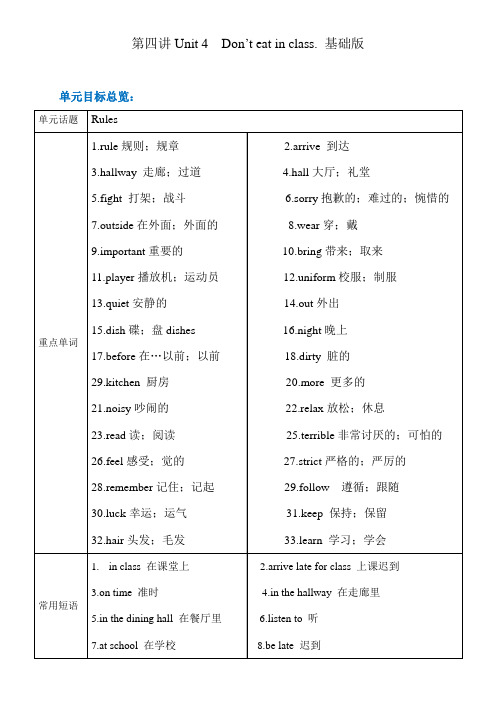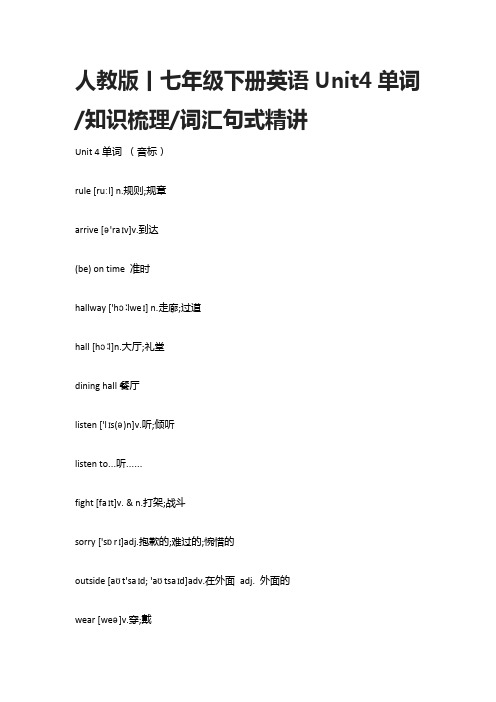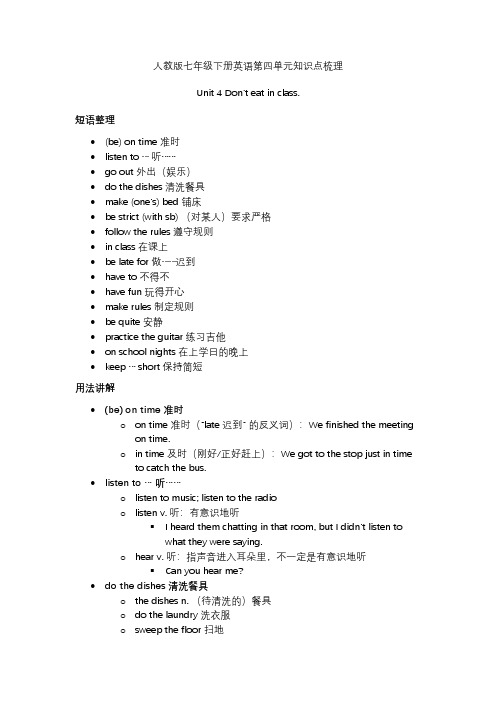人教版七年级下册英语第四单元
人教版七年级英语下册Unit4 要点详解1

Don ’t eat in class.要点详解1. arrive, reach, get以上三词均可表示“到达、抵达”之意,但用法不同。
arrive 后接at (小地方)或in (大地方——城市、国家)reach 直接连“某地”,get 加to 后再接某地。
如:I arrived in Beijing yesterday.They reached the Great Wall by bus.How can I get to the TV station?若要表示“到家/这儿/那儿”时,用arrive / reach / get 均可。
即:arrive / reach / get home / here / there2. in class 和in the classin class 表示“在上课”,而in the class 表示“在班上”。
Don’t talk in class.上课时不要谈话。
There are 40 students in the class.这个班有40位学生。
类似的短语还有:at table at the table in hospital in the hospital out of question out of the question in front of in the front of 在进餐在桌上(生病等)住院在医院毫无疑问不可能的在……的前面在……的前部⎧⎨⎩⎪⎧⎨⎩⎪⎧⎨⎩⎪⎧⎨⎩⎪3. have to 和mustmust 表示“必须、应该”,是从主观出发的,同时must 意味着一种“责任”与“义务”。
如:We must help our parents do some housework.have to “必须”“不得不”,常表示受外界环境、条件所迫要做的事。
如:There is nothing in the fridge. I have to go shopping now.4. else 其他的else 表示“其他的,此外”,常被置于特殊疑问句、不定代词之后。
人教版丨七年级下册英语4单元词汇,句型精讲(附练习题及答案)

人教版丨七年级下册英语4单元词汇/句型精讲(附练习题及答案)Unit4一、词汇精讲:1. arrive1)arrive 意为“到达”。
arrive at+小地点,arrive in +大地点。
例如:I will arrive in Beijing next week. 我下周到北京。
I arrived at the small village on a cold morning.在一个寒冷的早晨我到达了那个小村庄。
2)arrive 后面跟地点副词here, there, home时,不需要跟介词。
例如:arrive home 到家arrive here 到这儿注意:arrive late for与be late for是同义短语,都表示“做某事迟到”的意思。
arrive late for 强调动作晚,be late for 侧重状态晚。
例如:Don’t arrive late for the next test.=Don’t be late for the next test.下一次考试不要再迟到了。
2. listenlisten 是不及物动词,意为“听,倾听”,强调听的动作,后面接宾语时要加上介词to。
例如:We should listen to the teacher carefully.我们应该认真听老师讲课。
Listen! Someone is singing in the garden.听! 有人在花园里唱歌。
拓展:hear, listen和sound的辨析三个词都有“听”的意思,具体区别如下:hear 意思是“听说,听到”,侧重听到的内容。
例如:I heard someone cry in the next room last night.昨晚我听见有人在隔壁哭。
listen意思是“听”,侧重听的动作。
例如:Listen! Someone is crying.听!有人在哭。
sound作动词讲时是连系动词,意为“听起来”,后面跟形容词作表语,构成主系表结构。
七年级下册英语人教版第四单元单词

七年级下册英语人教版第四单元单词Unit 4 Don't eat in class.一、名词(n.)1. rule [ruːl] 规则;规章。
2. hallway [ˈhɔːlweɪ] 走廊;过道。
3. classroom [ˈklɑːsruːm] 教室。
4. fight [faɪt] 打架;战斗。
5. outside [ˌaʊtˈsaɪd] 外面;外部;在……外面。
6. dining hall [ˈdaɪnɪŋ hɔːl] 餐厅。
7. uniform [ˈjuːnɪfɔːm] 校服;制服。
8. dish [dɪʃ] 碟;盘。
9. kitchen [ˈkɪtʃɪn] 厨房。
10. before [bɪˈfɔː(r)] 在……以前;以前。
11. dirty [ˈdɜːti] 脏的。
12. noisy [ˈnɔɪzi] 吵闹的。
13. relax [rɪˈlæks] 放松;休息。
14. read [riːd] 读;阅读。
15. terrible [ˈterəbl] 非常讨厌的;可怕的!16. feel [fiːl] 感受;觉得。
17. strict [strɪkt] 严格的;严厉的。
18. remember [rɪˈmembə(r)] 记住;记起。
19. follow [ˈfɒləʊ] 遵循;跟随。
20. luck [lʌk] 幸运;运气。
21. hair [heə(r)] 头发;毛发。
22. learn [lɜːn] 学习;学会。
二、动词(v.)1. arrive [əˈraɪv] 到达。
2. listen [ˈlɪsn] 听;倾听。
3. wear [weə(r)] 穿;戴。
4. bring [brɪŋ] 带来;取来。
5. practice [ˈpræktɪs] 练习。
6. keep [kiːp] 保持;保留。
7. learn [lɜːn] 学习;学会。
三、形容词(adj.)1. important [ɪmˈpɔːtnt] 重要的。
人教版英语七年级下册Unit4Don’teatinclass.知识点及课后作业

第四讲Unit 4 Don’t eat in class. 基础版单元目标总览:【知识点详解】1、Don’t arrive late for class.上课不要迟到。
1)arrive 意为“到达”。
arrive at+小地点,arrive in +大地点。
◆I will arrive in Beijing next week. 我下周到北京。
◆I arrived at the small village on a cold morning. 在一个寒冷的早晨我到达了那个小村庄。
2)arrive 后面跟地点副词here, there, home时,不需要跟介词。
◆arrive home 到家arrive here 到这儿2、You must be on time.你必须准时。
(1)on time&in timeon time 意为“按时,准时”,指按照规定的时间或者指定的时间做某事;而in time指“及时”,指不迟到或在规定的时间之前或者接近所规定的时间做某事。
◆We must arrive there on time. 我们必须按时到达那里。
At last, the police arrived there in time. 最后警察及时赶到了那里。
(2)must情态动词,意为“必须”,不能单独做谓语,必须和动词原形以其构成谓语;其后接动词原形;其否定形式mustn’t意为“禁止,千万不要”◆I must do my homework before dinner.晚饭前我必须做完作业。
3、Don’t listen to music in class.不要再课堂上听音乐。
(1)listen 是不及物动词,意为“听,倾听”,强调听的动作,后面接宾语时要加上介词to。
◆We should listen to the teacher carefully. 我们应该认真听老师讲课。
◆Listen! Someone is singing in the garden. 听! 有人在花园里唱歌。
(完整版)人教版英语七年级下册第四单元短语语法知识点总结及练习

(完整版)人教版英语七年级下册第四单元短语语法知识点总结及练习Unit 4Don’t eat in class【短语归纳】1.on time 准时,按时2. listen to …听……3. in class 在课上4. be late for 做……迟到5. have to 不得不6. be quiet安静7. go out外出8. do the dishes 清洗餐具9. make breakfast 做早饭10. make (one’s) bed 铺床11. be noisy 吵闹12. keep one’s hair short 留短发13. play with sb. 和某人一起玩14. play the piano 弹钢琴15. have fun 玩得高兴16. make rules 制订规则【用法集萃】1.Don’t + 动词原形+其他,不要做某事。
2.help sb. (to) do sth. 帮助某人做某事3.too many + 可数名词复数太多的……4.practice doing sth. 练习做某事5. be strict with sb. 对某人要求严格6. be strict in sth. 对某事要要求严格7. leave sth sp. 把某物忘在某地8. keep + 宾语+形容词使……保持某种状态9. learn to do sth. 学会做某事10. have to do sth. 不得不做某事┃语法探究┃┃.祈使句定义:用于表达命令、请求、劝告、警告、禁止等的句子叫__________句。
时态:使用______________时态。
结构:动词原形+其他成分+please. 否定祈使句在动词原形前面加__________ 。
如:Be quiet in the classroom, please.在教室里请保持安静。
Don't fight. 不要打架┃.情态动词have to 和must1.情态动词have to和must都表示“__________”的意思。
人教版丨七年级下册英语Unit4单词,知识梳理,词汇句式精讲

人教版丨七年级下册英语Unit4单词/知识梳理/词汇句式精讲Unit 4单词(音标)rule [ruːl] n.规则;规章arrive [ə'raɪv]v.到达(be) on time 准时hallway ['hɔːlweɪ] n.走廊;过道hall [hɔːl]n.大厅;礼堂dining hall餐厅listen ['lɪs(ə)n]v.听;倾听listen to…听……fight [faɪt]v. & n.打架;战斗sorry ['sɒrɪ]adj.抱歉的;难过的;惋惜的outside [aʊt'saɪd; 'aʊtsaɪd]adv.在外面adj. 外面的wear [weə]v.穿;戴important [ɪm'pɔːt(ə)nt]adj.重要的bring [brɪŋ]v.带来;取来uniform ['juːnɪfɔːm]n.校服;制服quiet ['kwaɪət]adj.安静的out [aʊt]adv.外出go out 外出(娱乐)practice ['præktɪs]v. & n.练习dish [dɪʃ]n.碟;盘do the dishes清洗餐具before [bɪ'fɔː]prep. & conj.在…以前adv.以前make (one’s) bed铺床dirty ['dɜːtɪ]adj.脏的kitchen ['kɪtʃɪn]n.厨房more [mɔː]adj. & pron.更多的noisy ['nɒɪzɪ]adj.吵闹的relax [rɪ'læks]v.放松;休息read [riːd]v.读;阅读terrible ['terɪb(ə)l]adj.非常讨厌的;可怕的feel [fiːl]v.感受;觉的strict [strɪkt]adj.严格的;严厉的be strict (with sb)(对某人)要求严格remember [rɪ'membə] v.记住;记起follow ['fɒləʊ]v.遵循;跟随follow the rules遵守规则luck [lʌk] n.幸运;运气keep [kiːp] v.保持;保留hair [heə] n.头发;毛发learn [lɜːn] v. 学习;学会Clark [kla:k]克拉克(姓;男名)Amy [eɪmɪ]埃米(女名)Molly['mɒlɪ]莫莉(女名)New York [nju: jɔ:k]纽约unit4课本教材人教版丨七年级下册英语Unit4单词/知识梳理/词汇句式精讲!人教版丨七年级下册英语Unit4单词/知识梳理/词汇句式精讲!人教版丨七年级下册英语Unit4单词/知识梳理/词汇句式精讲!人教版丨七年级下册英语Unit4单词/知识梳理/词汇句式精讲!人教版丨七年级下册英语Unit4单词/知识梳理/词汇句式精讲!◆短语归纳1. on time 准时,按时2. listen to…听……3. in class 在课上4. be late for 做……迟到5. have to 不得不6. be quiet 安静7. go out 外出8. do the dishes 清洗餐具9. make breakfast 做早饭10. make (one’s) bed 铺床11. be noisy 吵闹12. keep one’s hair short 留短发13. play with sb. 和某人一起玩14. play the piano 弹钢琴15. have fun 玩得高兴16. make rules 制订规则◆用法集萃1. Don’t + 动词原形+其他。
人教版七年级下册英语第四单元知识点整理

人教版七年级下册英语第四单元知识点梳理Unit 4 Don’t eat in class.短语整理•(be) on time 准时•listen to … 听……•go out 外出(娱乐)•do the dishes 清洗餐具•make (one’s) bed 铺床•be strict (with sb) (对某人)要求严格•follow the rules 遵守规则•in class 在课上•be late for 做……迟到•have to 不得不•have fun 玩得开心•make rules 制定规则•be quite 安静•practice the guitar 练习吉他•on school nights 在上学日的晚上•keep … short 保持简短用法讲解•(be) on time 准时o on time 准时(“late 迟到” 的反义词):We finished the meeting on time.o in time 及时(刚好/正好赶上):We got to the stop just in time to catch the bus.•listen to … 听……o listen to music; listen to the radioo listen v. 听:有意识地听▪I heard them chatting in that room, but I didn’t listen towhat they were saying.o hear v. 听:指声音进入耳朵里,不一定是有意识地听▪Can you hear me?•do the dishes 清洗餐具o the dishes n. (待清洗的)餐具o do the laundry 洗衣服o sweep the floor 扫地o mop the floor 拖地o do the cooking 做饭•make (one’s) bed 铺床o Remember to make your bed!•be strict (with sb) (对某人)要求严格o The teacher is strict with us.•follow the rules 遵守规则o= obey the ruleso= observe the ruleso We must follow the rules in the school.•in class 在课上o You shouldn’t eat in class. 上课时不能吃东西。
人教版七年级下册英语第四单元课件

拓展
情态动词can的用法
用于疑问句中用来提出要求。例如: Can you...?“请你……好吗?”表示说话 人的请求。 Can I...?“我可以……吗?”用来征求对 方是否允许自己做某事。如在句末加上 please一词就显得更有礼貌了。例如:
Can you help me, please? 请你帮助我好吗?
• 他每天准时到校。
• He gets to school on time everyday
• 她及时赶到了医院。
• She reach the hospital in time. • be sitnrsiicdte with里s面b.的;在里部的
• 他爸爸对他很严格。
• His father is strict with him.
1. 表示能力(如体力和脑力方面),意为 2. “能;会”等。例如:
Can you speak English? 你会讲英语吗?
2. 表示请求或允许,多用在口语中,意为“可以; 能”等。例如: Can I help you? 我能帮助你吗? 用于否定句表示不允许。例如: You can’t play basketball. 你不能玩篮球。
have to + 动词原形 + …?
What do you have to do?
Where does she have to go? 2.have to 与must的区别
have to 着重于客观的需要,含有不得不的客观强 制性; must着重于主观上自己认为有义务,有必要 .She has to clean the classroom every week. I must go now. 在否定句中,don’t have to 表示没有必要, Mustn’t表示禁止.
- 1、下载文档前请自行甄别文档内容的完整性,平台不提供额外的编辑、内容补充、找答案等附加服务。
- 2、"仅部分预览"的文档,不可在线预览部分如存在完整性等问题,可反馈申请退款(可完整预览的文档不适用该条件!)。
- 3、如文档侵犯您的权益,请联系客服反馈,我们会尽快为您处理(人工客服工作时间:9:00-18:30)。
1.第二人称祈使句通常用来向听话者发出命 令,提出要求或建议。这种祈使句的主语 you通常不表示出来,而是以动词原形开 头。如: Stand up! Don’t worry
about!
拓展
祈使句
2.第一、三人称祈使句是以第一人称和第 三人称代词或者名词等作为祈使的对 象,这类祈使句通常以let为引导词表建 议。如:
Notes : 1 arrive in / at + 地点
get to +地点 reach +地点 (到达某地方 ) 2 class 班 ,课 3 in class 在课堂上 4 have classes 上课 5 be late for class 上课迟到
• on time 准时
in time 及时
拓展
情态动词can的用法
用于疑问句中用来提出要求。例如: Can you...?“请你……好吗?”表示说话 人的请求。 Can I...?“我可以……吗?”用来征求对 方是否允许自己做某事。如在句末加上 please一词就显得更有礼貌了。例如:
Let’s go! Let us go home! Let him be here by 10 o’clock.
拓展
祈使句
二、祈使句的强调形式及否定形式 1.祈使句的强调形式是在整个结构之前加
do。如:
Do give my regards to your parents! 务必/一定代我向你父母问好!
Don’t eat at home.
4. Listen to music outside.
Don’t listen to music outside. 5. Do your homework at school.
.Don’t do your homework at school.
拓展
情态动词can的用法
talk about rules
谈论规则
break the rules
违反规则
break the school rules 违反校规
break the class rules 违反班规
拓展
祈使句
一、祈使句的分类
祈使句表请求、命令、叮嘱、邀请、劝告 等。祈使句分为第二人称祈使句及第—、 三人称祈使句两大类。
Don’t eat in the classroom.
School Rules
Don’t listen to music in the classrooms or the hallways.
School Rules Don’t fight.
School Rules
Don’t talk in class. Don’t talk with each other in class.
• 他每天准时到校。
• He gets to school on time everyday
• 她及时赶到了医院。
• She reach the hospital in time. • be sitnrsiicdte with里s面b.的;在里部的
• 他爸爸对他很严格。
• His father is strict with him.
School Rules
Don’t sleep in class.
School Rules
Don’t use mobile phone in class.
School Rules
Don’t smoke. (No smoking)
We can’t rule the country without rules.
没有规章制度就不能治理好国家.
follow the rules
遵守规则
keep rules
family rules 家规
break rules 违反规则 library rules
school rules 校规
图书馆规则
dining rules 就餐规则
class rules 班规
Language goals
fight with sb. 同某人打架 fight the fire 救火
Explanation
fight 是不及物动词,其后加上with才能接 宾语。fight with sb. 意为“与某人打架”。 如: Don’t fight with your sister again.
不要再和你妹妹打架了。 They are fighting with the enemies bravely. 他们正在勇敢地同敌人战斗。
Unit 4
Don’t eat in class.
New words
hallway 走廊;过道
New words
classroom 教室
New words
rule
规则
New words
dinning 饭厅;餐厅
New words
fight
打架;争吵
Don’t fight . 不要打架. fight 战斗, 斗争, 作战
2.祈使句的否定形式是在整个结构之前加 don’t或never。如: Don’t be nervous!你不要紧张!
Practice 将下列祈使句改成否定形式。
肯定祈使句
否定祈使句
1. Sit down.
Don’t sit down.
2. Come in.
Don’t come in.
3. Eat at home.
重点短语
• ……迟到 arrive(be) late for ……
• 在走廊/餐厅 in the hallway/ dining hall
• 在教室/音乐教室 in the classroom/ music room
• 听(音乐) listen to (the music)
• 外出
go out
• 清洗餐具 do the dishes
• 铺床
make one’s bed
• 与某人打架 fight with sb
• 戴帽子
wear a hat/wear hats
School Rules
Don’t arrive late for class.
School Rules
Don’t run in the hallways.
School Rules
1. 表示能力(如体力和脑力方面),意为 2. “能;会”等。例如:
Can you speak English? 你会讲英语吗?
2. 表示请求或允许,多用在口语中,意为“可以; 能”等。例如: Can I help you? 我能帮助你吗? 用于否定句表示不允许。例如: You can’t play basketball. 你不能玩篮球。
